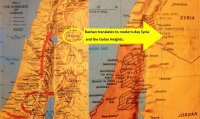seekeroftruth
Well-Known Member
Deuteronomy 4:41 Then Moses set aside three cities east of the Jordan, 42 to which anyone who had killed a person could flee if they had unintentionally killed a neighbor without malice aforethought. They could flee into one of these cities and save their life. 43 The cities were these: Bezer in the wilderness plateau, for the Reubenites; Ramoth in Gilead, for the Gadites; and Golan in Bashan, for the Manassites.
Well, this is a re-hash of what we read before but at least it's short and sweet.
This is from the easy English site.
These cities were in the south, in the centre and in the north of this area. In that society, if someone killed a person, the dead person’s closest relative could get revenge. If a person had killed someone by accident, he could go to one of those cities. There he would be safe from revenge.
Classicstudylight.org adds this.
God commanded that three cities of refuge be readied on each side of the Jordan River (Numbers 35:14), and here, the three cities on the east side of the Jordan are appointed.
Moses could not appoint all six cities of refuge, because they had not taken the land on the western side of the Jordan River yet. Still, though he could not obey all of God's command to appoint six cities of refuge, he did what he could - and appointed the three on the east of the Jordan.
Moses could not appoint all six cities of refuge, because they had not taken the land on the western side of the Jordan River yet. Still, though he could not obey all of God's command to appoint six cities of refuge, he did what he could - and appointed the three on the east of the Jordan.
Now here's a map of the location of those three cities.

The jewishvirtuallibrary.org site about the history of one of the three cities.
In Biblical times, the Golan Heights was referred to as "Bashan;" the word "Golan" apparently derives from the biblical city of "Golan in Bashan," (Deuteronomy 4:43, Joshua 21:27). The area was assigned to the tribe of Manasseh (Joshua 13:29-31).
The article I linked to above has a really interesting article about the history of the area, including it's place in the 6 Day War. Now I recall watching the news during the 6 Day War. I remember how incredible it was that a whole war could be fought in only 6 days.
Here's an bit of "modern" history on the site.
For Israel, relinquishing the Golan to a hostile Syria could jeopardize its early-warning system against surprise attack. Israel has built radars on Mt. Hermon, the highest point in the region. If Israel withdrew from the Golan and had to relocate these facilities to the lowlands of the Galilee, they would lose much of their strategic effectiveness.
One possible compromise might be a partial Israeli withdrawal, along the lines of its 1974 disengagement agreement with Syria. Another would be a complete withdrawal, with the Golan becoming a demilitarized zone.
After losing the 1999 election, Benjamin Netanyahu confirmed reports that he had engaged in secret talks with Syrian President Hafez Assad to withdraw from the Golan and maintain a strategic early-warning station on Mount Hermon. Publicly, Assad continued to insist on a total withdrawal with no compromises and indicated no willingness to go beyond agreeing to a far more limited "non#belligerency" deal with Israel than the full peace treaty Israel has demanded.
One possible compromise might be a partial Israeli withdrawal, along the lines of its 1974 disengagement agreement with Syria. Another would be a complete withdrawal, with the Golan becoming a demilitarized zone.
After losing the 1999 election, Benjamin Netanyahu confirmed reports that he had engaged in secret talks with Syrian President Hafez Assad to withdraw from the Golan and maintain a strategic early-warning station on Mount Hermon. Publicly, Assad continued to insist on a total withdrawal with no compromises and indicated no willingness to go beyond agreeing to a far more limited "non#belligerency" deal with Israel than the full peace treaty Israel has demanded.
Wow.... it's a mini history lesson this morning....

Last edited:
